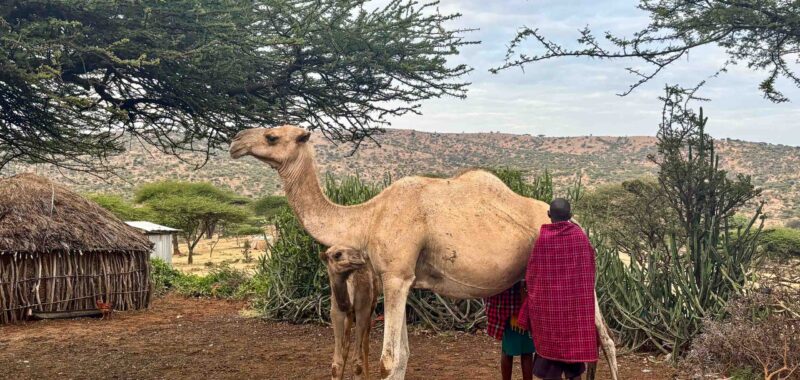Under a heavily clouded sky early the next morning, it’s time to meet some camels head-on. Mary Simaloi Lempoe, a Samburu housekeeper at Ol Lentille, takes me to George Lemuge’s home, where the camels are milked each morning—Lempoe lives in a nearby Samburu community which shares the revenue of Ol Lentille’s conservation fees. He has an agreement with Ol Lentille in which he sells a gallon of camel milk to the lodge each day for the staff to drink it with their meals.
As I stand in the corral, George tells me how he and his father walked north for 14 days to buy their first camels from the Turkana tribe—his favorite was a female named Mao. The investment paid off: During the extreme drought a couple years back, almost all the community’s cows died—but George didn’t lose a single camel. “Only the families with camels had any milk to drink,” George tells me. “So we rotated, different community members came here every morning and we gave it to them.”
As I gaze at a cute four-month-old calf with curly brown hair, Mary tells me about another important impact of rearing camels: Education. “You can’t let cows graze alone, so before, we had to have many people help look after them. But camels can look after themselves,” she tells me. “Now our children go to school, and the camels can graze at the same time.”
Mary shares her own story of how she had battled an abusive father to pursue a life that is still unusual in Samburu culture—she went to school, worked at Ol Lentille, and now she’s a single mother raising two kids. It’s early morning, and as Mary talks, a gaggle of young children walk past on their way to school. Mary calls over a girl in a bright red sweater; it’s her eight-year old daughter, Miriam Nangida. Miriam is shy; I squat to her level and say hello. The pride and love emanating from Mary as she looks at her daughter is so strong I feel it like a forcefield.
I don’t want to intrude on Miriam’s space, so I back up and smile as Mary waves her daughter off to school. Behind me, a camel lets out a grumbling call, impatient to be let out to graze, into this land that it now calls home.
**
The writer traveled to northern Kenya with Stanley Safaris, a specialist African operator that works exclusively with privately-owned, small-footprint lodges. She stayed at Kalepo Camp, Ol Lentille, and Lengishu, properties centered around community partnership and wildlife conservation.

